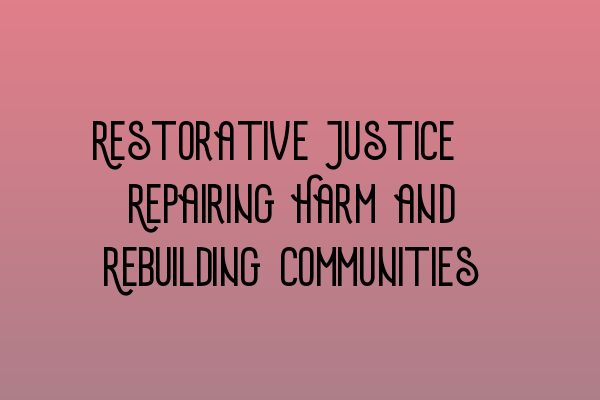Restorative Justice: Repairing Harm and Rebuilding Communities
Restorative justice is a powerful approach to addressing criminal offenses that focuses on repairing the harm caused by the crime and rebuilding the affected communities. The traditional criminal justice system often focuses solely on punishment, with little consideration for the underlying issues or the needs of the victims and offenders. Restorative justice aims to provide a more holistic and inclusive approach, promoting healing, accountability, and reintegration.
In restorative justice, the emphasis is on dialogue, empathy, and understanding rather than retribution. It brings together the victim, the offender, and their respective communities in a safe and facilitated environment. It encourages open and honest communication, allowing the victim to express their feelings and needs, and the offender to take responsibility for their actions.
This process not only allows the victim to have their voice heard and participate in the resolution but also offers the offender an opportunity to understand the impact of their behaviors and make amends. Through this collaborative process, the parties involved can work together to find solutions that address the harm caused and promote healing and reparation.
The Benefits of Restorative Justice
Restorative justice offers numerous benefits compared to traditional punitive measures. Firstly, it provides a sense of closure and satisfaction for the victim by actively involving them in the process and allowing them to see the impact and consequences on the offender firsthand.
Secondly, restorative justice focuses on repairing the harm done to the community as a whole. By involving the community, it fosters a sense of unity and shared responsibility for preventing future offenses. This approach can lead to the development of stronger and safer communities in the long run.
Thirdly, restorative justice promotes offender accountability and rehabilitation. It encourages offenders to face the consequences of their actions, take responsibility, and make amends. This can lead to personal growth and a higher likelihood of successfully reintegrating into society.
Additionally, restorative justice can be a cost-effective alternative to the traditional criminal justice system. It prioritizes dialogue and mediation, reducing the strain on already overloaded courts and minimizing the financial burden on the criminal justice system.
Implementing Restorative Justice
The successful implementation of restorative justice requires the collaboration of various stakeholders, including law enforcement agencies, legal professionals, community members, and support services. Training programs and educational initiatives play a crucial role in raising awareness and fostering a restorative mindset.
Legal professionals with knowledge and expertise in restorative justice are invaluable in facilitating the process effectively. Solicitors at SQE Criminal Law & Practice Law UK are well-versed in restorative justice principles and can provide guidance and support throughout the process.
For those seeking to enhance their understanding of criminal law and restorative justice, SQE 1 Preparation Courses can provide comprehensive knowledge and skills necessary to excel in the field. Furthermore, SQE 1 Practice Exam Questions and SQE 1 Practice Mocks FLK1 FLK2 are valuable resources to practice and assess one’s understanding.
If you’re preparing for the SQE 2 exam, SQE 2 Preparation Courses can equip you with the required competencies and knowledge specific to the criminal law and practice area.
Stay up to date with the SRA SQE Exam Dates to ensure you are well-prepared and ready to pursue a successful career in criminal law.
Restorative justice offers a promising alternative to traditional punitive measures. By focusing on repairing harm, fostering accountability, and rebuilding communities, it paves the way for a more compassionate and effective criminal justice system.
